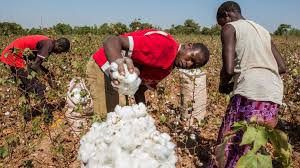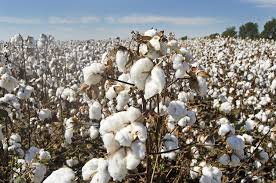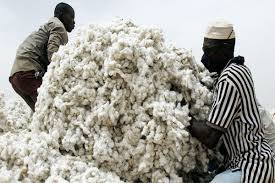![]()
If you’ve landed on this article page, you’re probably searching for a
good business idea—an idea that’s light on the pocket but heavy on
returns, promising both a fulfilling journey and potential profit.
|
How To Start A Lucrative Cotton Farming Business In Nigeria
Cotton farming is the cultivation of the cotton plant,
scientifically known as Gossypium hirsutum, for its fibers which
are used in the production of textiles, clothing, and other
related products. Cotton farming involves planting, nurturing,
and harvesting the crop, as well as processing the harvested
cotton fibers for commercial use.
Cotton farming is a significant sector of the Nigerian
economy. In Nigeria, cotton farming has played a crucial
role in the development of the agricultural sector, providing
job opportunities for millions of people in the rural areas.
According to the National Cotton Association of Nigeria
(NACOTAN), cotton is the second-largest agricultural export
commodity, contributing about 4% of the total GDP of Nigeria.
Cotton is one of the major cash crops in Nigeria. Its importance
has grown over the years with farmers making tons of profits.
Although there has been tremendous progress, a huge deficit in
supply still needs to be met. Major cotton producing states in
Nigeria include Zamfara, Kano, Kaduna, Katsina, Sokoto, Kebbi,
Ogun, Ondo, and Oyo. These states have the largest share of
production. The economic potentials of this industry are
enormous. Hence farmers can take advantage of these
opportunities to make wealth.
Cotton Farming:
The process of cotton farming starts with cultivating your
farmland. The good news is that you do not require a very
fertile farmland. This is because cotton is very tolerant crop
and grows well on poor soils. Hence applying fertilizer would
suffice. Silt loam is best for cotton farming. The soil PH value
should be 5.5. Ridges have to be made and seeds planted on them.
Because cotton grows into shrubs, adequate spacing is necessary.
These plants grow up to a meter tall. Wider row spacing from 38
to 40 inch should be adhered to. However narrower ridges can be
used with proper space management. 3 seeds should be planted per
hole and should be 1 inch deep. A 4 inch spacing between
plants/holes is necessary.
Crops begin to sprout a week or two after planting. It should be
noted that this requires an area with good rainfall. The plants
will blossom into shrubs. Cream and pink colored flowers emerge
briefly. This gives way to fruit at pollination. The fruits or
cotton bolls that emerge will later produce cotton. Before then,
you need to weed off your farm. This ensures the cotton plants
are given optimal growing conditions. Pest control is also
necessary within this period. This is because your crop is
likely to be attacked by pest. Proper pest control eliminates
pest and limits losses.
Cotton Formation and Harvest
The fruit/boll that emerges after flowering later splits open,
exposing the cotton. This is ready for harvest after all the
plant bolls are open. The cotton fibre is allowed to dry. This
results in a fluffy texture. The next stage involves picking the
cotton. This is picked or harvested with the seed and gathered
into bales. The cotton ginnery is where it is sent for
separation. Here, the fluffy lint is separated from the seeds.
These are collected or packed into bales and made ready for the
textile or cotton spinning mills. These are essentially the
steps you follow in cultivating your cotton crop.
Cost Implications of Cotton Farming
Profit margin is largely determined by cost implications. This
becomes a very vital area of business you do not want to
overlook. The major cost implications for cotton farming arises
from seedlings, pesticides/chemicals and fertilizer. However the
largest capital requirement is land. This is where a major part
of your expenses will be channeled into. Depending on where the
land is located, this can go anywhere from N600, 000.00 to N5,
000,000.00 per plot. Having a land saves you a lot of cost. Cost
of farm inputs pales in comparison to that of obtaining a land.
The average cost for cultivating cotton on a hectare of land
include the following; labour-N50,000.00, seedlings-N5,000.00,
Fertilizer-N30,000.00, agro-chemicals -N20,000.00, tools and
implements-N20,000.00. By totaling these expenses, you have
N125,000.00. However this can be significantly higher or lower
depending on factors like inflation and the exchange rate value.
Profit Potential of Cotton Farming
On average, a hectare of land will yield 2 to 4 tonnes of
cotton. Therefore translating this to its cash equivalent, a ton
of cotton ranges from N165,000.00 to N180,000.00. Using the
N180,000.00 benchmark and multiplying by the total yield (2 to 4
tonnes per hectare) you obtain N360,000.00 to N720,000.00. This
shows a great potential for profits, especially when compared to
the cost of production. The returns of investment is
appreciable. While this is the case, you need total diligence
and commitment to realize such results.
Mechanized Cotton Farming
Although most of the farming practices in Nigeria is manual,
mechanized farming is practiced in a handful of places. This is
not very popular among farmers due to the cost implications.
However it is the best system of commercial farming. To exploit
its advantages, small farm holdings are less than ideal. You
will need vast farmlands, a hectare and above for maximum
output. For the most part, our attention has been on the manual
methods of cotton farming. Mechanized farming on the other hand
requires significant financial investments. Some of the
equipment you would have to buy include tractor(s), combine
harvesters as well as other accessories.
This significantly cuts down on time as well as labor
requirement. This is necessary for large scale farming. Using
this option, work is simplified and productivity improved. Under
this method, large storage facilities are necessary. There you
have it. The basics of cotton faring in Nigeria. The
opportunities are there for the taking. Everyone can start
commercial cotton farming. However your scale of production will
be determined by your financial strength.
Nigeria has the potential to become a significant player in the
global cotton market, with a conducive climate for cotton
farming and large arable land suitable for cotton cultivation.
The country has the capacity to produce enough cotton to meet
local demands and even export to other countries. The government
has implemented several policies to encourage cotton farming,
including the Anchor Borrowers’ Programme and the CBN Cotton
Intervention Programme, to boost cotton production and export.
Farmers in Nigeria
choose the type of cotton to plant based on factors such as soil
type, climate, and the prevailing pest and disease pressure in
their region. The choice of cotton variety can also be
influenced by market demand for specific types of cotton fibers.
Acquire Land and Inputs
To start a cotton farm, farmers need to acquire suitable land
and the necessary inputs, such as cotton seeds, fertilizers, and
pesticides. They can purchase or lease land, depending on their
resources and preferences, and buy inputs from reputable
suppliers who offer quality products at reasonable prices.
Prepare the Land
Once farmers have acquired land, they need to prepare it for
cotton cultivation. This involves clearing the land of weeds and
debris, tilling the soil, and applying fertilizers and other
soil amendments to improve soil fertility and structure.
Plant Cotton
Cotton seeds should be planted at the right time and depth to
ensure proper germination and growth. Farmers should also
consider spacing the plants properly to optimize their yield
potential and facilitate pest and disease management.
Manage the Crop
During the growing season, farmers need to manage their cotton
crop carefully to maximize yields and quality. This includes
monitoring the crop for pests and diseases, irrigating the
plants as needed, and applying fertilizers and other inputs to
support healthy growth.
Cotton is typically harvested by hand or with machines,
depending on the farm size and equipment availability.
Harvesting should be timed carefully to ensure optimal yield and
quality, and the cotton should be handled and transported
carefully to avoid damage and contamination.
Market the Cotton
Once the cotton is harvested, farmers need to market it to
buyers and processing companies. They can sell the cotton
locally or export it to other countries, depending on the market
demand and prices.
In addition to timing, other factors that can affect cotton
yields and quality include soil fertility, water availability,
and pest and disease control. To optimize their cotton
production, farmers need to implement best farming practices,
such as proper soil preparation, irrigation, and pest
management.
Get our Practical Training Guide on Cotton farming in Nigeria.
We will provide you with proper insight into successful Cotton
farming. This guide covers all aspects of establishing new
Cotton Farm orchards or expanding existing farms, from suitable
varieties and site selection to soil management, pest control,
harvesting best practices.
|







